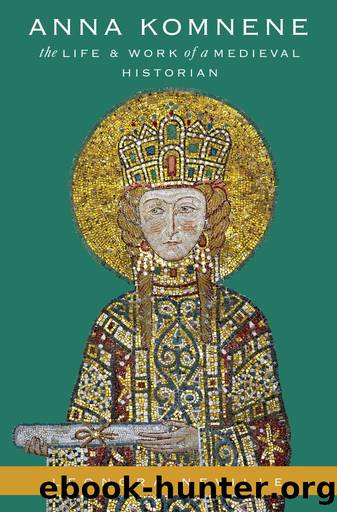Anna Komnene by Leonora Neville;

Author:Leonora Neville;
Language: eng
Format: epub
Publisher: OUP Premium
Published: 2016-06-15T00:00:00+00:00
FIGURE 7.1 Pair of Kolti with Sirens. Enamel on gold (5.3 cm x 5.6 cm). These pendants were affixed to caps so that they hung along the side of the face. Strings of pearls or beads originally were attached to the hoops around the edges. The figures on the front are mythological sirens with the bodies of birds and the heads of women. The backsides have geometric designs.
© Dumbarton Oaks, Byzantine Collection, Washington, DC.
Tornikes implies that Annaâs brilliance in fact exceeded that of men, but he felt that saying so would be disrespectful to men. In this Tornikes substantiates the understanding that deference to masculine authority was a foundation value of Byzantine culture. There would be something fundamentally inappropriate in saying that Annaâs star exceeded the brightness of those of her male contemporaries.
The theme of prodigiousness returns at the end of the oration when Tornikes deliberates about whether to praise Anna as a man or as a woman. The key difficulty is that Anna did not fit his cultureâs ideas about female behavior. He praises her by ascribing to her some masculine characteristics:
Oh! What mouth is silenced! What eyes are closed! What intelligence is stopped! What mind is veiled! What charms have vanished! Woman more manly than men, exceeding them in wisdom and prudence! Soul, strong and befitting a man, confined in a delicate and female body! O body, bearing such a greatness of soul, you contain such courage, such magnanimity, such intelligence, such a treasure of wisdom, such an overabundance of thought!100
Although Anna exceeds men in the masculine characteristics of wisdom and prudence, and possesses a soul fit for a man, she remains a woman, and her accomplishments are thus more remarkable. Anna makes the men look bad by taking up masculine work:
The deeds of men fail because of you, as much as the female gender prospers. Oh! Hands that wielded tablets and pen instead of wool and spindle; who skillfully wove the beauty of words into a garment.101
Tornikes does not know how to properly praise Anna because he cannot settle on a proper comparison. He does not know if he should compare her to women, or to men:
To whom shall I compare the one who is entirely unsurpassable? A women? But her superiority is not measurable with the word, because splendidly she both had the fairest beauty of the women and was rich with respect to the valorous deeds of men. A man? But she also prevails over them, since with a womanâs body she is equal to the best of them, for I am ashamed to say she surpassed them. Oh! Wiser than men, more beautiful than women, and all the world speaks with respect! Oh! Beauty more august than that of women! Oh! Wisdom more graceful than that of men!102
Anna surpasses men in wisdom, despite the limitations of her body, but equally surpasses women in beauty. She is both masculine and feminine.
In this disruption of gender norms Anna has become an entirely paradoxical creature. Unable to
Download
This site does not store any files on its server. We only index and link to content provided by other sites. Please contact the content providers to delete copyright contents if any and email us, we'll remove relevant links or contents immediately.
| Military | Political |
| Presidents & Heads of State | Religious |
| Rich & Famous | Royalty |
| Social Activists |
Waking Up in Heaven: A True Story of Brokenness, Heaven, and Life Again by McVea Crystal & Tresniowski Alex(37018)
Empire of the Sikhs by Patwant Singh(22185)
We're Going to Need More Wine by Gabrielle Union(18085)
Hans Sturm: A Soldier's Odyssey on the Eastern Front by Gordon Williamson(16776)
Leonardo da Vinci by Walter Isaacson(11918)
The Radium Girls by Kate Moore(10915)
Educated by Tara Westover(7075)
Tools of Titans by Timothy Ferriss(6964)
How to Be a Bawse: A Guide to Conquering Life by Lilly Singh(6701)
The Last Black Unicorn by Tiffany Haddish(5081)
Permanent Record by Edward Snowden(5007)
The Rise and Fall of Senator Joe McCarthy by James Cross Giblin(4852)
Promise Me, Dad by Joe Biden(4455)
The Wind in My Hair by Masih Alinejad(4427)
The Crown by Robert Lacey(4115)
A Higher Loyalty: Truth, Lies, and Leadership by James Comey(4039)
The Iron Duke by The Iron Duke(3650)
Joan of Arc by Mary Gordon(3270)
How to be Champion: My Autobiography by Sarah Millican(3193)
